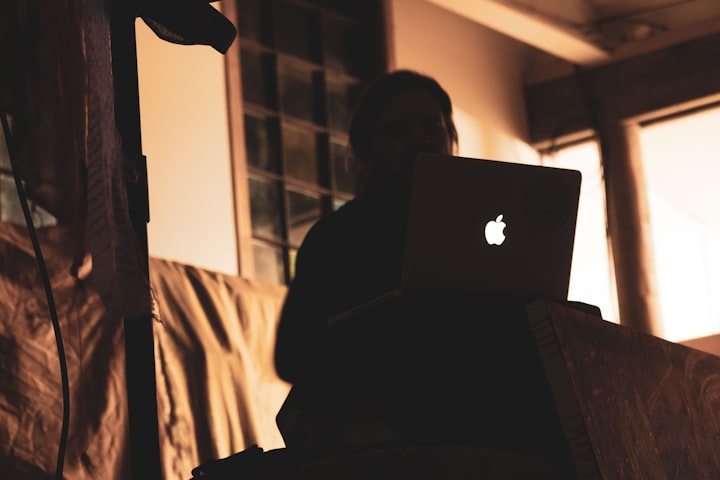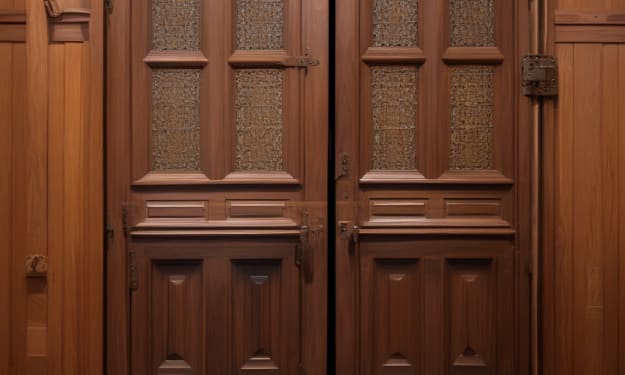
I expected Serena to be a woman of ordinary tastes and an amusing if not arousing search history. But as I opened her up to my methods of inquiry, I found her to be like ice on a lake, obscuring all the mystery below the surface. Despite the self-preserving guardedness I employ in these situations, I was compelled. Here was a complicated tangle of a woman, and because I knew with certainty how began the ends of this knot, I alone could possibly understand Serena.
I began in a small way, employing the most junior of tricks with only glancing interest. Her passwords were pitifully weak (‘zero1234’ across the board), and I glanced cursorily over the messy divorce, catalogued unprotected in desktop folders: invoices from lawyers, court documents, and affidavits (she served him). Here was something unusual, though, for a woman of her age and class: as far as I could discern, she had no social media accounts. I was bored and my empathies tickled (my own bitter divorce) enough to reach out using the number her daughter had left on the ticket. We agreed to meet for coffee at a place on the recently revitalized Main Street of our otherwise flagging mill town.
I like to imagine what they look like, and am adrenalized when I get close. I therefore felt exuberant when Serena approached the table, blonde hair trailing. She was built like a tightly coiled spring: thin, muscular limbs clamped firmly to her frame, jetting back and forth with unexpected energy with each stride. Her eyes glowed with the acuity of a cat on its ninth life.
We rapidly covered hobbies, weather, and pets before straying towards the realm of goals, dreams, and one’s life trajectory—an inappropriate topic, I mused, for two adults nearing middle age.
“My only ambition”, I assured her, “is to be completely free of ambitions.”
“Oh, yes!” she nodded emphatically. Lowering her voice, she added, “You really understand the treadmill we’re all on.” She nodded as she said this. “The only way to find peace is to simply step off." I noted her spaghetti straps, which were sliding hazardously down her sun-bronzed shoulders.
“I’ve always imagined it—this thing we’re all on—as more of a StairMaster,” I offered, and tugged on my smoothie.
Serena considered. “Well, that makes more sense, metaphorically speaking.”
Surely she’d realize the absurdity of this conversation.
“Because life’s a climb, huh?” she added.
Afterwards, I paid the bill and Serena, yanking down her pencil skirt with one hand, waggled the fingers of the other at me in goodbye.
That was almost it. One quick peek—end of story. I certainly had seen enough. But that evening, through the porous walls of my wandering mind, my thoughts floated to the Great StairMaster of Life. Was she actually convinced that the absence of everything made a full life? And had she really stepped off the treadmill? The manicure suggested otherwise.
Two and a half weeks ago, it was teenage daughter Jessica who tiptoed self-consciously into the shop, Mom’s laptop under her arm.
“Is this Digital Doctor?” she asked dubiously, as if the cramped, windowless office crowded by defunct computers and the other detritus of my work could be anything but.
Service with a smile. “The Doc is in! I’m Brian, and I’m your guy!” I chirped, swiveling around.
She was an underdressed, overproduced little thing, beautiful and wretched in the way of the American teenager, from sea to shining sea.
“I’m Jess. This is my mom’s laptop, and it, like, keeps showing these weird error messages when she tries to turn it on.”
“Let’s take a look at it.” I jetted towards her in my rolling chair. I smiled, hoping to convey senility and passive disinterest and relieve her of every girl’s intrinsic fear of older men holed up in dark basement offices. I grabbed the laptop and pressed the power button until the indicator light flashed from red to green. A message appeared onscreen and I knew immediately what the issue was—something trivial. A Windows update would do the trick. But I glanced at Jessica’s sad little eyes and expensive jewelry, and I felt the sensation take hold of me—an automatic, consuming need to know, and the smugness that accompanies my power to know it.
“Hmm,” I contemplated the screen with my patented look of concern. “This one’s going to take me a while. Let me write you a ticket.”
On our second date, we walked Serena’s twin cocker spaniels by the reservoir. We set up a grill at the swim beach and cooked hot dogs that were actually expeller-pressed wheat protein isolate and lentils. She talked of her friends and their financial troubles.
What about your own financial troubles? I wanted to ask her. I’d peeked at her Kaiser Permanente medical records: a slew of prescriptions designed to enhance fertility; a billing squabble over a hormonal injection from a fertility clinic in Puerto Rico; six rounds of IVF, to the tune of five grand each—the last of which, I surmised, resulted in Jessica (all that work to be a mother for someone who no doubt resents Serena for being just that). At face value, Serena is as bland as the rubbery soy pellets she eats as a substitute for animal meat.
I, however, recognize her stout veganism as her stand for the sanctity of life. She’d fought hard to bring her own daughter into the world. Frankly, I was touched by the extreme measures she took for Jessica. Tapping into her Chase banking account, I found $70,000 in a joint 529 fund (Serena plus ex-husband), for Jessica, no doubt, but just $789 in savings. How could she drive the car and have the hair and nails yet live so close to the brink?
And another thing—Serena had transferred money to and received money from an account at a bank in Venezuela seven times in the past nine months. Was she aware of these transactions? Or was she being scammed?
Our conversational momentum ground to a halt when I suggested that Jessica take a year after high school to figure herself out.
“It’s something I wish I would have done,” I assured her. “It will give her some time to work through the divorce, too.”
She gave me a funny look and I realized that the divorce had not come up in conversation.
We drove home in her Buick (so unaffordable!), me sweating in the passenger seat, surely having blown it in a weird way. To my surprise, she kissed me outside my townhome. She tasted like wheat protein isolate.
“You’re so intuitive, Brian. I hope we can do it again some time.”
Intuitive! Yes! I felt a warmness spread through my limbs. The Buick sped away down the darkened lane.
That night, I lay awake and fantasized about my death—or, rather, what I hoped to make of it. Like a wealthy and eccentric baron, I thought I might bury my (wholly unimpressive) life’s wealth in gold bars somewhere in the Mojave desert. I would leave a trail of clues, all in riddles, with the first hidden in my last will and testament. Then it occurred to me that this chase would only give me pleasure in the abstract, as I would by necessity be dead during its actualization. I soured.
Well, isn’t everything better in the abstract? Like the honeymoon with my ex-wife. We’d rented an RV and rambled one thousand miles across the country to the Grand Canyon, glossed up and glowing on our brochure. And there we were, freshly wedded and at the real-live overlook, the famed vista obscured by fat tourists in khakis, the air thick with diesel fumes, children screaming at mothers who were screaming at their husbands, and a lady holding her baby out above the asphalt while it urinated.
Or, I reminisced, like the dimensions of the world as a child. In my youth, every corner of my suburban subdivision was indisputably populated by bizarre, magical creatures. I built homes for the endemic garden fairies and adopted a stray cat, Tofu, as my companion. I could hear his thoughts, and him mine. And gradually, without my consent or even my comprehension, the magic evaporated. The fairy neighborhood was just a line of unhealthy-looking imported ornamental Chinese trees abutting the fence that separated our backyard from another identical backyard. Tofu was just a mute cat, and by that point, a dead one.
I matriculated in the Digital Age and found a kind of surrogate magic in computers. From the inhospitable, hormone-soured walls of junior high, I escaped to the thick arcade graphics of Galaga and Robotron. College was equally unimpressive, but I squeaked through with a degree in computer science just as the entire world needed computer nerds. I imagined myself crawling the web, fighting cybercrime for the CIA, heroic in the way of an old arcade game. Just as every English lit grad isn’t Hemingway, I was no cyberwarrior. I became Doctor Digital and settled for the dark basement office. The only problems I solved were faulty operating systems and overheating processors, my hobby scouring the miseries of other people.
I was scrolling through Serena’s deleted emails, a vast wasteland of digital shopping coupons and promotions from a Buddhist retreat that she apparently attended, when I noticed the desktop folder: “My Poetry”. Opening it, I discovered over seventy poems, mostly on nature and loneliness. Her prose was pedestrian, but she paid attention to the beauty of the ordinary (raindrops on windows, fallen leaves, old barns, etc.) and I felt a tug of affection for her and her humanness. Oh, the tactics we use to combat that particular emptiness.
On our next outing, paddleboarding at the reservoir, I noted with a new, soft interest the way Serena scanned the horizon and pushed the stray hair from her mouth. We made plans for Sunday to see a folk band downtown.
Two days later, I was browsing Serena’s Photos desktop app, hoping to find some of her, when she called my cell. I glanced furtively around the room before answering, as if she might be peeking in through the bedroom window. But she was at some bar, music and laughter evident in the background.
“Hey Brian,” she giggled, and I could tell she was tipsy.
“Serena, it’s good to hear your voice,” I replied, and it was.
“I just wanted to call and confirm our plans for tomorrow evening,” she said, and hiccupped. In the background, I heard a woman’s voice hiss, “Don’t forget to ask about my damn laptop!”
Serena laughed and put her mouth back to the receiver. “I am obliged to ask you about your progress on my friend’s laptop,” she cooed.
“What do you mean? Who is your friend?”
“It’s the laptop I had Jess bring over to your office over a month ago,” she said. “My best galfriend just moved to town and she needs it for her new job.”
“But…Jessica said…it was yours...” I felt my throat constrict. Serena’s voice seemed to slur, the bar music pulsing.
“It’s my best friend Serena’s laptop.” She pulled the phone away from her mouth. In a distant chorus, I heard the two women sing, “We are Serena Squared!” and erupt into laughter.
“I’m Serena Proctor, she’s Serena Riardson,” Serena continued, voice back to the receiver.
Serena Riardson. Wasn’t that the name I’d seen on every legal document, medical record, email, and account on the laptop? Signed under every poem?
I heard her voice now come to me from the mouth of a tunnel. By the time her words reached my ears, they were magnified and distorted to the point of incomprehension.
The woman on the call was a stranger. I hung up, and the green caller icon on-screen flashed quietly to red.
About the Creator
Kela Fetters
Consistently floored by nature facts






Comments
There are no comments for this story
Be the first to respond and start the conversation.